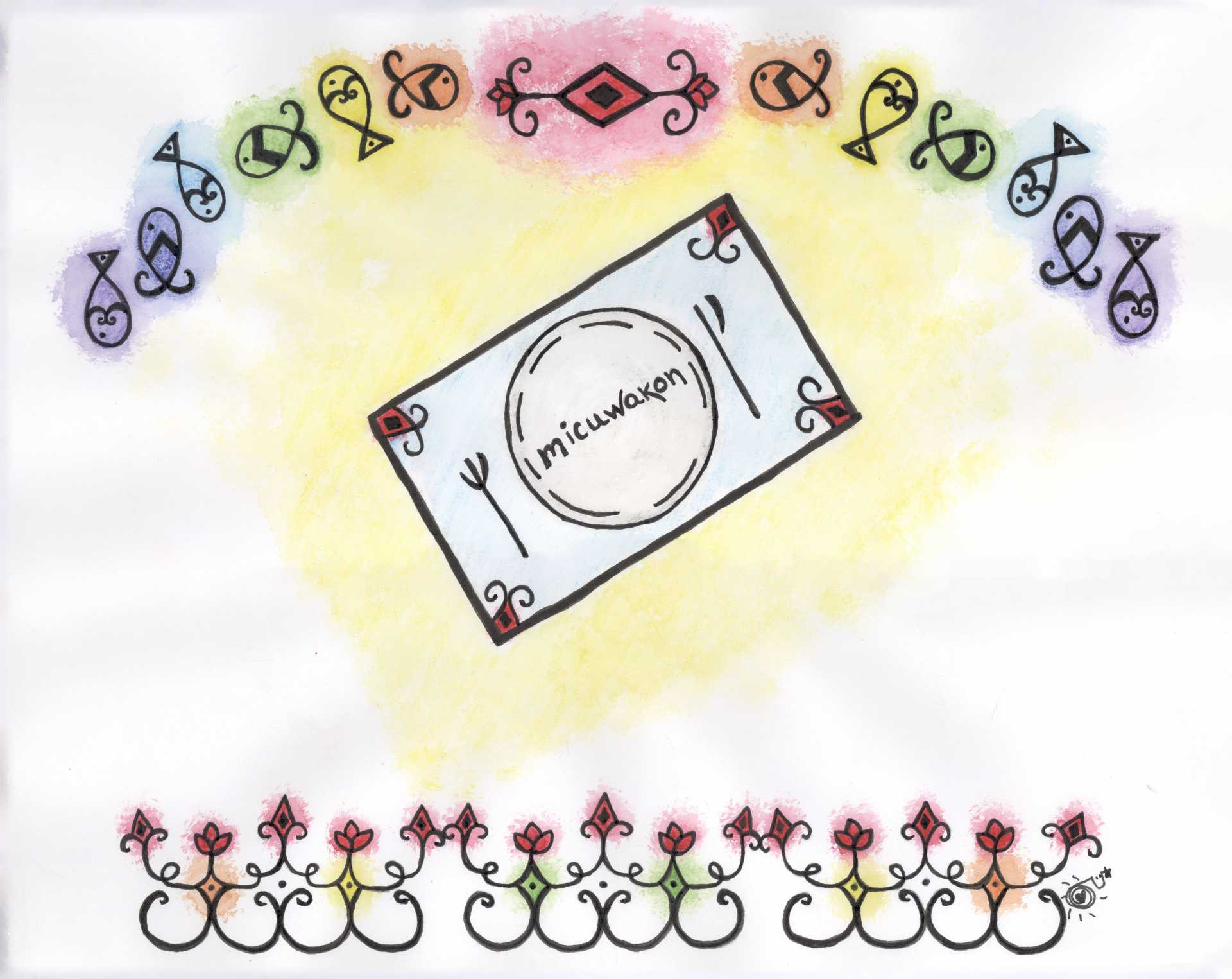


Tellement de souvenirs se construisent autour d’une table. Tellement d’échanges s’y produisent. Tellement de partage, de rires, de traditions. La sécurité alimentaire pour tous les êtres humains est une lutte essentielle qui se doit d’inclure le droit à la chasse, à la pêche ainsi qu’aux autres activités ayant la subsistance pour fondement. L’utilisation et le développement durable des ressources de Terre-Mère doivent être une constante considération.
Accueil / Module 4 / Nourriture

Micuwakon naka mitsultimok wisokokimqotul ‘ci nilun eleyimok.

La nourriture est un aspect essentiel de la culture.
Tan eci maqahahtiyeq weci mitsultiyeq, minuwi ollukhotipon tahalu kansuhsok ellukhotihtihtpon askomiw.

Lorsque nous nous rassemblons pour partager un repas, nous répétons une tradition qui s’est transmise de nos ancêtres jusqu’à nous depuis des temps immémoriaux.
Mecimi-te Wolastoqiyik uci-miluwaniya micuwakon cika ote tan eci notuwok.

Le peuple wolastoqey a toujours partagé la nourriture, même lorsqu’elle se faisait rare.
Amsqahseweyak Okamonuhkewiyik petapasihtihtpon ‘kihtakomikumon assokitahasultuwok kehsok micuwakon micihtit tan eci kisi koluwok kotunkahtimok.

Les premiers Européens qui sont venus sur ce continent ont d’ailleurs été surpris par les immenses festins célébrant une chasse fructueuse.
Mawihpultin, mec-ote pemkiskahk, tan eci maqahamok naka olotahkewakonol tahalu Wolastoqey eleyimok.

Partager des repas ensemble est, encore aujourd’hui, un aspect important de plusieurs rassemblements et cérémonies dans la tradition wolastoqey.
 ⎙
⎙
| Ihtolahqahtimok | La cuisine | The kitchen |


| |||
|---|---|---|---|---|---|---|
| Nutahqet | Un cuisinier | A cook |

|
|||
| Ntotolaq. | Je cuisine. | I am cooking. |

|
|||
| Ktotolaq. | Tu cuisines. | You are cooking. |

|
|||
| Ktotolaq? | Est-ce que tu cuisines? | Are you cooking? |

|
|||
| ‘Kisahq? | As-tu cuisiné? | Did you cook? |

|
|||
| Keq etoloqosomon? | Que cuisines-tu? | What are you cooking? |

|
|||
| Keq kisaqosomon? | Qu’as-tu cuisiné? | What did you cook? |

|
|||
| Keq oc ketuwaqosomon? | Que vas-tu cuisiner? | What will you cook? |

|
|||
| Mec-op-al ktolahq? | Vas-tu cuisiner? | Will you cook? |

|
|||
| Tama ktotolahq? | Où cuisines-tu? | Where are you cooking? |

|
| Micuwakon | Nourriture | Food |


| |||
|---|---|---|---|---|---|---|
| Opan | Pain | Bread |

|
|||
| Lakalet | Banique | Frybread, bannock |

|
|||
| Pocetes | Patate | Potato |

|
|||
| Wiyuhs | Viande | Meat |

|
|||
| Otuhkey | Viande de cerf | Deer meat |

|
|||
| Musey | Viande d’orignal | Moose meat |

|
|||
| Ehemuwey | Poulet | Chicken |

|
|||
| Nomehsey | Poisson (chair) | Fish meat |

|
|||
| Polamuwey | Saumon (chair) | Salmon meat |

|
|||
| Kihkaney | Fruit ou légume | Fruit or vegetable |

|
|||
| Wawon | Œuf | Egg |

|
| Tokec | Présent | Present tense |


| |||
|---|---|---|---|---|---|---|
| Ktotolaq? | Est-ce que tu cuisines? | Are you cooking? | ||||
| Aha. Ntotolaq. | Oui. Je cuisine. | Yes. I am cooking. |

|
|||
| Ontama. Ma-te ntotolahqew. | Non. Je ne cuisine pas. | No. I’m not cooking. |

|
|||
| Keq etolaqosomon? | Que cuisines-tu? | What are you cooking? | ||||
| Ntotolaqosomon wiyuhs. | Je cuisine de la viande. | I’m cooking meat. |

|
|||
| Ntololaqosomonol pocetesol. | Je cuisine des patates. | I’m cooking potatoes. |

|
|||
| Ntotolaqosomonol wawonol. | Je cuisine des œufs. | I’m cooking eggs. |

|
| Kisi | Passé | Past tense |


| |||
|---|---|---|---|---|---|---|
| Kisahq? | As-tu cuisiné? | Did you cook? | ||||
| Aha. Nkisahq. | Oui. J’ai cuisiné. | Yes. I cooked. |

|
|||
| Ontama. Ma-te nkisahqew. | Non. Je n’ai pas cuisiné. | No. I have not cooked. |

|
|||
| Keq kisaqosomon? | Qu’as-tu cuisiné? | What did you cook? | ||||
| Nkisaqosomon musey. | J’ai cuisiné de la viande d’orignal. | I cooked moose meat. |

|
|||
| Nkisaqosa opan naka ksap. | J’ai cuisiné du pain et de la soupe. | I cooked bread and soup. |

|
|||
| Nkisaqosomon ehemuwey naka piyeskomonol. | J’ai cuisiné du poulet et du maïs. | I cooked chicken and corn. |

|
| Koti | Futur | Future tense |


| |||
|---|---|---|---|---|---|---|
| Mec-op-al ktlolahq? | Vas-tu cuisiner? | Will you cook ? | ||||
| Ontama. Ma-te nkotuwahqew. | Non. Je ne vais pas cuisiner. | No. I won’t cook. |

|
|||
| Aha. Ntlolahq oc. | Oui. Je vais cuisiner. | Yes, I will cook. |

|
|||
| Keq ketuwaqosomon? | Que vas-tu cuisiner? | What will you cook? | ||||
| Ntolaqosomonol oc wawonol. | Je vais cuisiner des œufs. | I will cook eggs. |

|
|||
| Ntolaqsomon oc othuhkey. | Je vais cuisiner de la viande de cerf. | I will cook deer meat. |

|
| Ihtolihpultimok* | Salle à manger* | Dining room * |


| |||
|---|---|---|---|---|---|---|
| * ‘Ciw yut tan tehpu tama ihtolihpultimok. | * Cette expression fait aussi référence à tout endroit où l’on mange, par exemple un restaurant. | *This expression is also used to refer to places where one eats such as a restaurant. | ||||
| Spasihpultin | Déjeuner | Breakfast |

|
|||
| Pasqihihpultin | Diner | Lunch |

|
|||
| Wolaqihpultin | Souper | Supper |

|
|||
| Wisahp! | Dépêche-toi! Mange! | Hurry up and eat! |

|
|||
| Mits! | Mange! | Eat! |

|
|||
| Mitsiq! | Mangez (deux personnes)! | Eat! (2 people) |

|
|||
| Mitsultiq! | Mangez (trois personnes ou plus)! | Eat! ( 3 people or more) |

|
|||
| Mawihpultine. | Mangeons tous ensemble. | Let’s all eat together. |

|
|||
| Nisihpine. | Mangeons ensemble. (toi et moi) | Let’s eat together. (you and me) |

|
|||
| Wolicuwehtahs. | Mets la table. | Set the table. |

|
|||
| Macephan ktahtuwalot ihtololahqahtimok. | Apporte ton assiette à la cuisine. | Take your plate to the kitchen. |

|
| Minuwokehkims wici papehcikesuwakonol naka asitewtomuwakonol. | Entraîne-toi avec des questions et des réponses. | Practice with questions and answers. |


| |||
|---|---|---|---|---|---|---|
| Kotuhp? | As-tu faim? | Are you hungry? | ||||
| Ontama. Ma-te nkotuhpiw. | Non. Je n’ai pas faim. | No. I’m not hungry. |

|
|||
| Aha. Nkotuhp. Mawipultine. | Oui. J’ai faim. Allons manger. (tous ensemble) | Yes. I’m hungry, let’s go eat. (all together) |

|
|||
| Aha. Nkotuhp. Ntoli ihtolihpultimok. | Oui. J’ai faim. Je vais au restaurant. | Yes, I’m hungry, I’m going to the restaurant. |

|
|||
| Aha. Nkotuhp. Naci-nisiw spasihpine. | Oui. J’ai faim. Allons déjeuner ensemble. (toi et moi) | Yes, I’m hungry, let’s go eat breakfast together (you and me). |

|
|||
| Koti maha opan? | Veux-tu manger du pain? | Do you want to eat bread? | ||||
| Aha. Nkoti-maha opan. | Oui. Je veux manger du pain. | Yes. I want to eat bread. |

|
|||
| Ontama. Ma-te nkoti-mahaw opan. | Non. Je ne veux pas manger de pain. | No. I don’t want to eat bread. |

|


| ||||||
|---|---|---|---|---|---|---|
| Kis kisihp? | As-tu déjà mangé? | Did you eat yet? | ||||
| Aha. Kis nkisihp. | Oui. J’ai mangé. | Yes. I ate. |

|
|||
| Aha. Ntoli kisihp nuhkumossok. | Oui. Je suis allé(e) manger chez notre grand-mère. | Yes, I ate at my grandmother’s. |

|
|||
| Wolihpuksu? | Est-ce que c’était bon? | Was it good? | ||||
| Aha. Wolihpuksu lakalet. | Oui. La banique est bonne. | Yes, the frybread is good. |

|
|||
| Ontama. Ma-te wolihpuksuwiw. | Non. La banique n’est pas bonne. | No. The frybread is not good. |

|